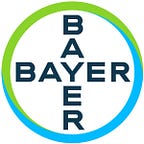An Intern’s Story: Creative Muscles, Food Labels and GMOs
By Meredith Roman, Communications Intern, LifeHub, Boston
I’m going to be honest: I don’t know very much about agriculture. Most everything I learned about plants is buried back in my high school biology class, or that botany book I bought and got only 1/3 through. Until last week when I started my summer internship, I didn’t even know what canola looked like when it’s not oil.
While I spend my days at work surrounded by experts in the agriculture “field” (pun intended), my background is mostly in film and media production. I study at Emerson College right here in Boston. I make posters, design name tags, edit videos, take pictures, and could talk about a movie I saw this weekend for hours, but I couldn’t tell you much about the science behind the foods we grow and eat.
This makes how I ended up at LifeHub Boston, a Bayer innovation site looking to connect with local innovators, entrepreneurs, and experts, a bit more of a puzzle. After combing through internships online for months, I came across the LifeHub intern position — close to my campus, and unlike any other media job I had applied for. Rather than focusing on one aspect of the production process (writing, producing, editing, camera operating), LifeHub Boston was offering an internship that would allow me to flex all of my creative muscles at once, at Bayer, a major Life Sciences company nonetheless. Even better, having just completing my Entrepreneurial Studies minor, I was excited to apply to a company where I could explore all of my interests and skills and even more excited when I got the position.
Once I got started and got to know everyone in the office, I was introduced to the event I’d eventually help promote and support — AgConnect. AgConnect is LifeHub Boston’s monthly event series focused on networking and learning in the agriculture industry. We invite the Cambridge community to come to our space and connect with each other as well as Bayer. Each event has a specific theme under agriculture, creating great opportunities to bring in both internal and external speakers on a number of topics. This month the focus was on food labels, what they mean and how they impact the nutritional value and safety of the food we purchase. We were lucky to have Kelly Bristow, a dietician working with Bayer’s Crop Science division, talk with the group about the confusing and sometimes misleading labels on the products we buy.
After meeting with some of the attendees, like an agriculture engineer from Nigeria, a grad student from France with a passion for food science and a group of colleagues from Crop Science, Kelly started her discussion.
With large posters around the room (that I got to design!), the audience was invited to post questions about different common labels we often see all over our food. We even had a salt shaker full of non-GMO pink Himalayan sea salt (BTW, salt isn’t an organism so it doesn’t even have genes to modify yet product labelling would make you think otherwise.)
Some facts I learned from Kelly:
There are only 11 commercially available genetically modified crops
Wheat is NOT one of them
“Local” on a food label can mean your food comes from as far as 400 miles away
“Organic” foods can still use pesticides on crops
The vitamins and minerals listed at the bottom of the Nutrition Facts panel on food packaging are the top nutrients Americans are lacking in their diet. They’re included to encourage people to find foods with higher levels of things like potassium and iron to make up for those deficiencies in their diet.
And this is just a small portion of the topics we covered. After posing some questions to continue the discussion, the audience was given a minute to pitch their own passion projects to the group. To get to hear the passion across diverse interests the Cambridge community brings to LifeHub Boston was a meaningful reminder of why I came to this internship in the first place — to meet new people, learn new things about the entrepreneurial and innovative communities, and practice my own diverse skills within that. I’m not only learning about agriculture but I’m also flexing all of my creative muscles for a major player in the Life Sciences industry. How great is that?
